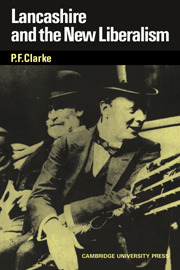Book contents
- Frontmatter
- Contents
- Preface
- Abbreviations
- Dedication
- PART ONE INTRODUCTION
- PART TWO FORMATIVE INFLUENCES
- PART THREE THE TERMS OF THE CONTEST
- PART FOUR THE RECONSTITUTION OF LIBERAL LANCASHIRE
- 7 C. P. Scott and Progressivism
- 8 The sinews of war
- 9 Men of light and leading
- PART FIVE FIELDS OF RECRUITMENT
- PART SIX GOING TO THE COUNTRY
- PART SEVEN CONCLUSION
- APPENDICES
- Bibliography
- Index
9 - Men of light and leading
Published online by Cambridge University Press: 23 November 2009
- Frontmatter
- Contents
- Preface
- Abbreviations
- Dedication
- PART ONE INTRODUCTION
- PART TWO FORMATIVE INFLUENCES
- PART THREE THE TERMS OF THE CONTEST
- PART FOUR THE RECONSTITUTION OF LIBERAL LANCASHIRE
- 7 C. P. Scott and Progressivism
- 8 The sinews of war
- 9 Men of light and leading
- PART FIVE FIELDS OF RECRUITMENT
- PART SIX GOING TO THE COUNTRY
- PART SEVEN CONCLUSION
- APPENDICES
- Bibliography
- Index
Summary
Many of us have to do with electioneering, and we know what happens constantly when a constituency has to find a candidate. The party looks round first of all for the man whom it knows, the local man whose character it knows, whose position it knows, because he has taken a considerable part in local politics, and very often it happens that it is unable to get a single man out of the constituency or even in the neighbourhood. They have to go to some rich outsider. What happens then is that the constituency has to choose without knowing the man. They have to take his character from the party Whip.
C. P. Trevelyan, 1911One day in 1899 Herbert Gladstone had a discussion about candidates with one of the foremost Manchester Liberals, William Holland. ‘Hugh Fullerton deficient in position’, was their conclusion about one. The kind of notions which underlay this comment were more clearly exposed by the Conservative M.P. for Gorton when he explained that a Member ‘had other duties to perform than in the House of Commons’, and that if his Lib–Lab opponent were returned, ‘he would not be able to do anything to encourage the social life and institutions of the division’. In the conventional view the candidate was still expected to be a social leader rather than a mere public person. He was expected to give generously in the constituency, not only for political objects, but for a wide range of good and not so good causes.
- Type
- Chapter
- Information
- Lancashire and the New Liberalism , pp. 220 - 246Publisher: Cambridge University PressPrint publication year: 1971



